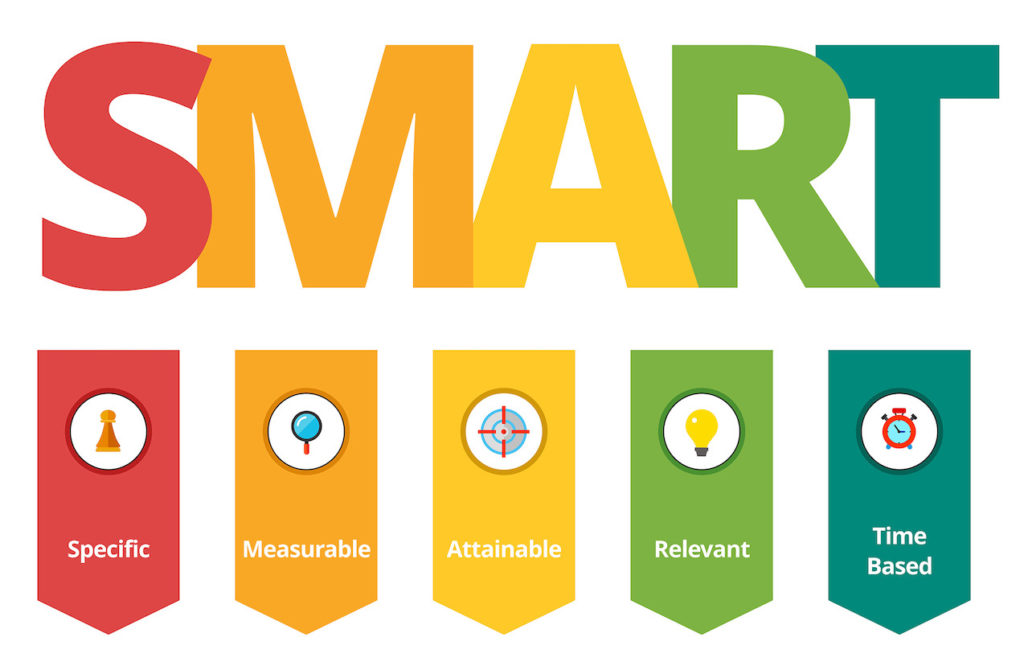The Importance of Goal-Setting and its Benefits
Happy New Year!
As a new year starts, it is natural to set about a thousand different goals that you want to accomplish within the next few months.
A survey conducted by NPR indicated that 44% of Americans are likely to make New Year’s resolutions. Sadly enough, the same study shows that a vast majority gave up their goals by mid-January, and the rest giving up sometime between February and March (Poon, 2019).
Goal setting is an essential tool for self-motivation, self-driven personally, and professionally. It provides us with a meaning for our actions and a purpose for our lives (Chowdhury, 2019).
What is Goal Setting?

Goal setting is defined as the action of choosing an objective one aspires to achieve by developing an action plan to motivate and guide one towards a goal. The practice is a crucial component of personal growth. According to Dr. Edwin A. Locke, the father of goal-setting research, explains “Goals are the object or aim of an action, for example, to attain a specific standard of proficiency, usually within a specified time limit” (Latham & Locke, 2002 p.705).
Locke’s studies revealed that specific and measurable goals yield better overall results. The theory of goal setting emphasizes motivation. The incentive is the reason that some people perform better than others, confirming that setting and adjusting goals has a direct impact on performance.
It is relatively easy to think about a long list of objectives one desires to reach. However, the challenge is to determine if you are willing to make the sacrifices to achieve your goals. Take athletes as examples; anyone can see their successful achievement when raising a trophy, but people fail to consider the countless hours of training and the many sacrifices they made to get where they are. Regardless of the scope of your goals, they require time and effort to attain such objectives. The exact amount will be determined by your drive and desire to achieve them.
The Importance of Goal Setting
 Several positive emotions are connected with goal achievement. When accomplishing an objective, an individual feel successful, confident, and fulfilled. A study found that a person who correctly builds a goal-setting process, when faced with adversity, assists in hunting for new strategies to aid the progress of goal achievement. Additionally, finding different ways to employ skills, advances the individual’s abilities while increasing self-efficacy and self-confidence (Schunk, 1985).
Several positive emotions are connected with goal achievement. When accomplishing an objective, an individual feel successful, confident, and fulfilled. A study found that a person who correctly builds a goal-setting process, when faced with adversity, assists in hunting for new strategies to aid the progress of goal achievement. Additionally, finding different ways to employ skills, advances the individual’s abilities while increasing self-efficacy and self-confidence (Schunk, 1985).
Conversely, other studies prove that skill-oriented planning significantly improves the well-being of those who actively make plans and create goals. Positive thinking about the future strengthens the ability to develop objectives and the actions necessary to achieve them. A goal without a plan is almost impossible to attain, especially when it comes to long-term objectives. There are principles to this process that must be applied during the planning period. Goals must be laid out in a way where they are achievable and yet challenging.
Crucial Principles of Goal Setting
During the planning and framework development, understanding the theoretical procedure is critical for a prosperous plan. A systematic and specific goal is more likely to be achieved than one that is vague and impulsive. Thus, well-defined objectives lead to better performance (Houston, 2019).
According to research conducted by Locke and Latham (1990) in the ’90s, suggest five core principles for successful goal.
 Commitment. It is the degree to which an individual is devoted to their goals and the determination to overcome obstacles to achieve them. Goal performance is directly linked to the desire that an individual has to attain that goal. The level of commitment will determine the pace in which an individual will take to obtain the objective. When less committed to goals – especially when faced with challenging obstacles – the likelihood of giving up increases. Several factors can affect one’s commitment levels, namely, the anticipated desirability and ability to achieve it.
Commitment. It is the degree to which an individual is devoted to their goals and the determination to overcome obstacles to achieve them. Goal performance is directly linked to the desire that an individual has to attain that goal. The level of commitment will determine the pace in which an individual will take to obtain the objective. When less committed to goals – especially when faced with challenging obstacles – the likelihood of giving up increases. Several factors can affect one’s commitment levels, namely, the anticipated desirability and ability to achieve it.
 Clarity. When a goal is vague, it limits the motivational value of it. The clarity of the intent directly relates to the motivation and the enjoyment of achieving it. Setting clear, precise, and explicit goals that can be measured is paramount for your success. Building a plan with clear steps improves the understanding of the task at hand; thus, improving your odds of success.
Clarity. When a goal is vague, it limits the motivational value of it. The clarity of the intent directly relates to the motivation and the enjoyment of achieving it. Setting clear, precise, and explicit goals that can be measured is paramount for your success. Building a plan with clear steps improves the understanding of the task at hand; thus, improving your odds of success.
 Challenging. A challenging goal is essential to improve performance. It increases self-satisfaction and the motivation to create new strategies to push your skills to the limit. On the other hand, if goals are not attainable, they will lead to feelings of defeat and frustration. If your goal is challenging, yet within your capability to achieve it, you are more likely to be motivated to complete such a task (Houston, 2019).
Challenging. A challenging goal is essential to improve performance. It increases self-satisfaction and the motivation to create new strategies to push your skills to the limit. On the other hand, if goals are not attainable, they will lead to feelings of defeat and frustration. If your goal is challenging, yet within your capability to achieve it, you are more likely to be motivated to complete such a task (Houston, 2019).
 Task Complexity. Demanding tasks and overly complicated may affect productivity as it may become overwhelming; subsequently, affecting your morale and motivation. Dissecting complex goals into more straightforward tasks with a realistic timetable will improve performance. Additionally, allotting sufficient time to carry out your objectives allows you to reflect on the complexity of it and adjust when necessary.
Task Complexity. Demanding tasks and overly complicated may affect productivity as it may become overwhelming; subsequently, affecting your morale and motivation. Dissecting complex goals into more straightforward tasks with a realistic timetable will improve performance. Additionally, allotting sufficient time to carry out your objectives allows you to reflect on the complexity of it and adjust when necessary.
 Feedback. It helps measure your actual progress against your plan. When properly administered, feedback is an invaluable tool providing crucial information on your real progression to attain your goal. If the improvement is substandard, feedback allows you to evaluate your current position and adjust the strategy in accordance with your desires and plans. Assessing your strategy is critical, and the absence of such can potentially reduce the progression rate.
Feedback. It helps measure your actual progress against your plan. When properly administered, feedback is an invaluable tool providing crucial information on your real progression to attain your goal. If the improvement is substandard, feedback allows you to evaluate your current position and adjust the strategy in accordance with your desires and plans. Assessing your strategy is critical, and the absence of such can potentially reduce the progression rate.
How and Why Goal Setting Works
Many different studies suggest that people who correctly set goals and persist in attaining those objectives are more likely to achieve them. Additionally, when goals are specific and challenging, it boosts effectiveness, as it requires higher performance, yet provides a higher sense of satisfaction once attained. Goal setting directs attention away from trivial tasks and behaviors into focusing on achieving a specific task.
Eliminate goals
 When goals are not attained, our immediate reaction is to undertake changes to our strategy. Failure is not always caused by the planning or lack thereof, but most likely, the goal selection itself. Therefore, it is crucial to create steps that keep the focus on one primary goal at the time. Eliminate anything else that might take your attention away from your main objective.
When goals are not attained, our immediate reaction is to undertake changes to our strategy. Failure is not always caused by the planning or lack thereof, but most likely, the goal selection itself. Therefore, it is crucial to create steps that keep the focus on one primary goal at the time. Eliminate anything else that might take your attention away from your main objective.
You might have heard many experts insisting on thinking bigger or reaching for the clouds. The dilemma that most people face is that they do not understand the importance of dissecting their objectives into a realistic timetable. Yes, I believe that you can do whatever you set your heart on to do. However, if today you decide to start jogging, it does not mean you will be able to run a marathon on the following week regardless of how athletic you might be. The goal is attainable; however, the set timing makes it impossible to achieve.
Thus, reaching for the clouds without a proper plan could gravely inflict on progress and choke motivation. Achieving goals take time and dedication. Psychologists agree that the pursuit of goals should be focused. Hence, the fastest manner to progress is to concentrate on one goal at the time.
For instance, you cannot possibly be training for a marathon while working full-time, taking college classes, learning photography, and taking swimming classes. There is not enough time in the day or in a week to be successful in all of them. Reorganizing priorities could drastically change the landscape of your deadlines, as progression comes much quicker. Perhaps placing the marathon and photography in the back burner while you are in college and taking swimming classes. It all depends on your priorities and what you are trying to achieve first.
If you want to crush your goals, you will have to be selective, simplistic, and go all in.
Implementation intention
 Habits are essential to achieve your goals. The implementation intention is a self-control strategy. The primary idea is to change unwanted behavior. One example is to write down precise sentences about your plans:
Habits are essential to achieve your goals. The implementation intention is a self-control strategy. The primary idea is to change unwanted behavior. One example is to write down precise sentences about your plans:
I will [ACTION] at [TIME] in [LOCATION]
- I will read for thirty minutes at 8 pm in my bedroom
- I will exercise for one hour at 5 am at the gym near the house
The idea is to make time to change a habit or to develop one. The nurture of such practices will lead you to your desired goal. If your goal is to lose 10 lbs, then you will have to add a meal prep and packing your lunch daily.
Various researches indicate that people are more likely to follow through a habit when there is an implementation plan in place, which is often referred to as implementation intention. The caveat is that it does not work when attempting to improve multiple habits simultaneously. This does not apply to less substantial goals. For instance, if you are trying to eat healthier or meditate more, those are items that can be easily added in between bigger goals.
On average, an action takes at least two months to build memory muscle. Creating a perfect implementation is crucial for a successful outcome.
What Skills are Required?

Essential skills are required to set and achieve goals successfully. Depending on what you are attempting to do, it can be very demanding and will require time and patience to complete them. If those goals are your priority, it is vital to focus and achieve them as necessary. If you are not able to accomplish your goals, review the following areas:
Planning. Low-Quality planning negatively affects performance. Planning and organizing are essential for the goal achievement process (Smith, Locke & Barry, 1990). The plan allows us to prioritize and maintain the necessary focus to accomplish the task at hand while avoiding distractions.
Self-Motivation. Without the desire to achieve our goals, we are doomed to failure. The motivation is what sparks our minds to develop creative approaches to succeed. In fact, self-motivation is a crucial factor in goal attainment.
Time Management. This is a useful skill in many aspects of life, including goal setting. Such a skillset is required to accomplish a goal successfully and promptly. If the timetable is not considered during the planning phase, failure is inevitable. Furthermore, time allocation directly impacts task performance. The more time spent in the planning stage, the more likely we are to succeed.
Flexibility. At some point, things are going to happen and derail current planning. Flexibility to work around barriers and adapt is paramount. The determination to press on in time of adversity is essential to reaching your goal.
Self-regulation. Anyone seeking a goal must regulate their own emotions and personal desires. Developing emotional intelligence is essential when designing motivational goals, aims, and missions.
S.M.A.R.T Goal Setting

There are different methods to organize and structure your goals. The most common is form using the SMART technique. Instead of vague planning, SMART assists you in authenticating the trajectory towards your objectives, while establishing milestones, estimation, and goal attainability.
S is for Specific
 When selecting your goals, it is crucial to be as specific as possible. This process can make the difference by making it reachable versus the frustration of an unattainable goal.
When selecting your goals, it is crucial to be as specific as possible. This process can make the difference by making it reachable versus the frustration of an unattainable goal.
During the planning phase, you should ask yourself the following questions:
- What do you want to achieve?
- Where?
- How?
- When?
- With whom?
- What are the limitations to attain the goal?
- Why do you want to reach the goal? What are the possible alternatives to achieve the same results?
M is for Measurable
 This step requires you to dissect your intentions into measurable elements. Defining your goal into digestible parts with concrete evidence makes it more navigable and more likely to attain. When developing a goal you should be able to measure it in different one way or another.
This step requires you to dissect your intentions into measurable elements. Defining your goal into digestible parts with concrete evidence makes it more navigable and more likely to attain. When developing a goal you should be able to measure it in different one way or another.
A is for Attainable

When you weigh all the factors such as time, efforts, places, and other costs; is your goal attainable?
If you do not have the talent, time, or money to achieve specific goals, they are likely not attainable. It does not mean that you cannot be successful, it just means that you must plan accordingly. You cannot run a marathon within two weeks if you are not able to run three miles.
R is for Relevant
 Is reaching the goal relevant to you? That is something that only you can answer for yourself. Think about the goals in your life, and consider which ones do you really want to do? If you are wanting to learn a new skill, schedule classes, and follow-through.
Is reaching the goal relevant to you? That is something that only you can answer for yourself. Think about the goals in your life, and consider which ones do you really want to do? If you are wanting to learn a new skill, schedule classes, and follow-through.
T is for Time
 For everything that you are planning, be sure to add a deadline. For deadline is what makes you go further. It is essential, however, to keep the timeline realistic and flexible. Being too strict on your goal can have unintended consequences.
For everything that you are planning, be sure to add a deadline. For deadline is what makes you go further. It is essential, however, to keep the timeline realistic and flexible. Being too strict on your goal can have unintended consequences.
Categories for setting goals
Technically, you can predominantly identify three categories when setting our goals. This technique helps you to focus on specific categories or multiple areas simultaneously.
 Time goals – Can be dissected into short-term or long-term. Goals that will take a few days or weeks to achieve can be categorized as short-term. Covertly, goals that will take longer than twelve months fall into the long-term goals.
Time goals – Can be dissected into short-term or long-term. Goals that will take a few days or weeks to achieve can be categorized as short-term. Covertly, goals that will take longer than twelve months fall into the long-term goals.
 Focus Goals – These are your primary objectives, life-changing achievements you aim towards. They tend to fall into a long-term category and require multiple steps and many adaptations over time. For instance, the goal of “I will be practicing law by the end of 2025”. It will require you to attain a bachelor’s degree first, then be accepted into law school for the Juris doctors. It is a multi-step goal that will take several years to complete, and it might require adjustments along the way.
Focus Goals – These are your primary objectives, life-changing achievements you aim towards. They tend to fall into a long-term category and require multiple steps and many adaptations over time. For instance, the goal of “I will be practicing law by the end of 2025”. It will require you to attain a bachelor’s degree first, then be accepted into law school for the Juris doctors. It is a multi-step goal that will take several years to complete, and it might require adjustments along the way.
 Topic-Based Goals – Those will fit into specific areas of your life. Topic goals are usually related to personal life, career, finances, health. For example, a financial goal might be “save $1,000 by March of this year”; or a personal goal would be “drop 10 lbs by the end of February”.
Topic-Based Goals – Those will fit into specific areas of your life. Topic goals are usually related to personal life, career, finances, health. For example, a financial goal might be “save $1,000 by March of this year”; or a personal goal would be “drop 10 lbs by the end of February”.
Outlining Your Personal Goals
Only you know what you want to achieve. This outline will simply assist you with the process to set clear and concise goals yet detailed enough to keep you in the right direction.
Set three goals

As the new year comes around, the temptation to setting goals is there. Though enthusiasm is a good thing, it is important not to jump into it too fast. When limiting the number of goals, there is a better chance to be successful and avoid overwhelming. Take baby steps by setting just a few small goals, as you begin this life-long journey of setting and attaining goals.
As you achieve your first objectives, set more challenging ones, and perhaps one long-term goal. Remember to review them regularly. It might be beneficial to revisit your progress daily or weekly, depending on the nature of the objective.
Short-term goals give you the opportunities to review and acknowledge the achievement of the goal. Frequent success results in positive emotions and increased motivation to set additional goals.
Make Your Goals Positive
Word your goals in a positive manner. Goals such as “I want to lose weight because I am unattractive,” comes from a negative view and can affect your performance. The best way to word such objectives would be “I want to be healthier and lose some weight.”
Psychologically, failure to achieve a positive goal, give us the feeling that though we failed, we are still on the right path.
References:
Chowdhury, M. (2019, May 2) A Look at the Psychology of Goal Setting Retrieved from https://positivepsychology.com/goal-setting-psychology/
Locke, E.A. & Latham, G.P. (2002). Building a Practically Useful Theory of Goal Setting and Task Motivation: A 35-Year Odyssey, American Psychologist.
Schunk, D. H. (1985). Participation in Goal Setting: Effects On Self-Efficacy and Skills of Learning-Disabled Children. The Journal of Special Education.
Smith, K., Locke, E., & Barry, D. (1990). Goal Setting, Planning, and Organizational Performance: An Experimental Simulation. Organizational Behavior and Human Decision Processes, 46. 118-134. 10.1016/0749-5978(90)90025-5.
Houston, E (2019, June 19) What is Goal Setting and How to Do it Well Retrieved from https://positivepsychology.com/goal-setting/
Poon, L. (2019, January 16) The Rise and Fall of New Year’s Fitness Resolutions, in 5 Charts Retrieved from https://www.citylab.com/life/2019/01/do-people-keep-new-years-resolution-fitness-weight-loss-data/579388/


Comments are closed.